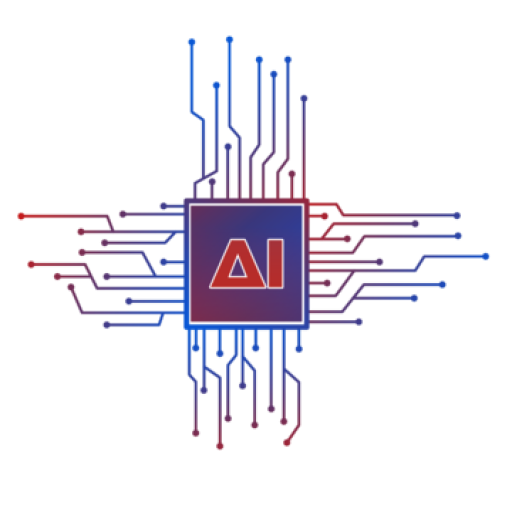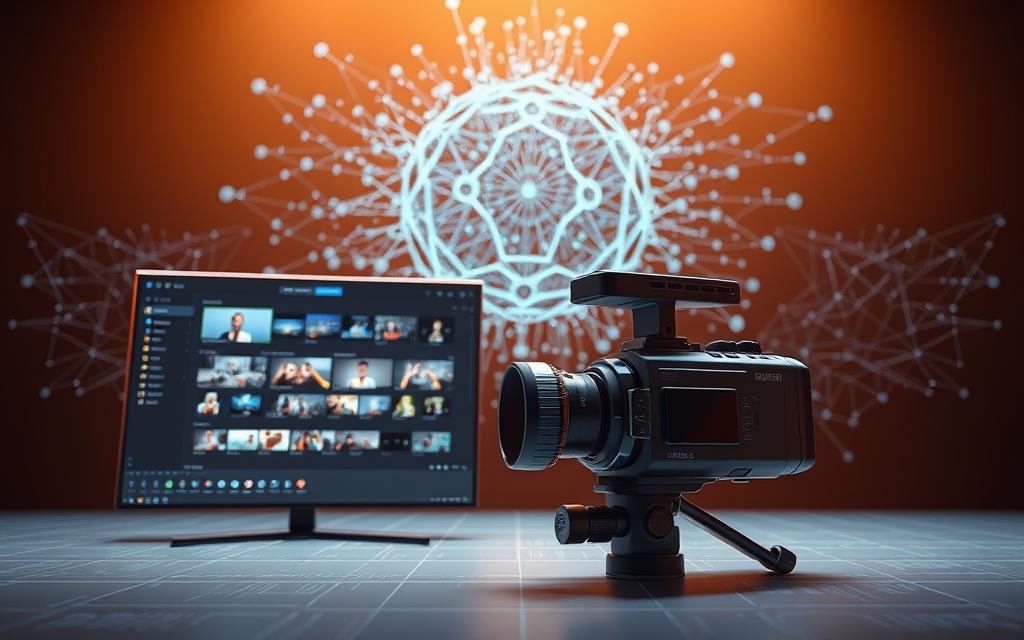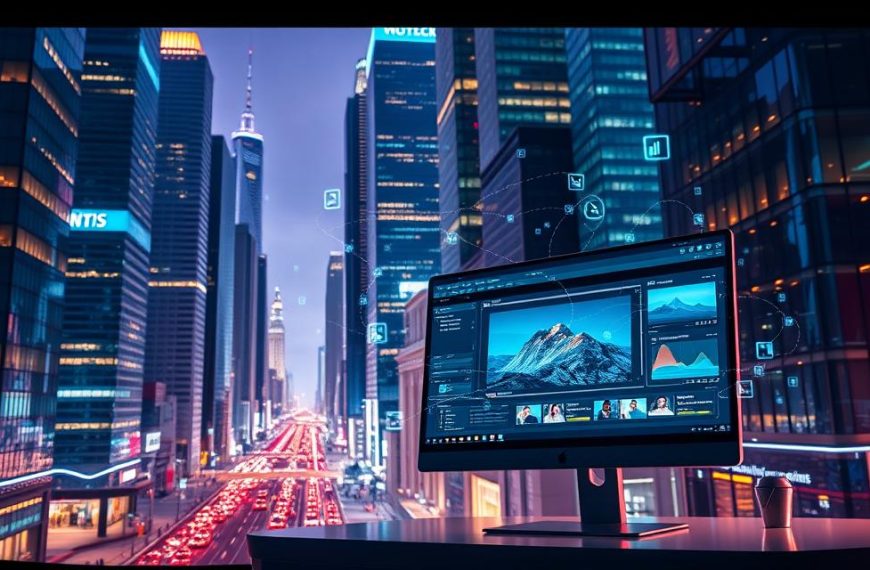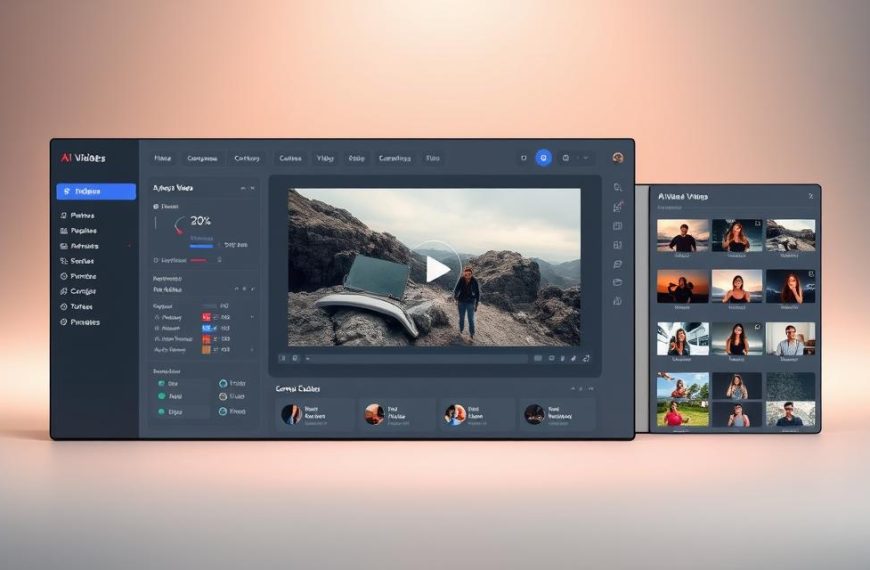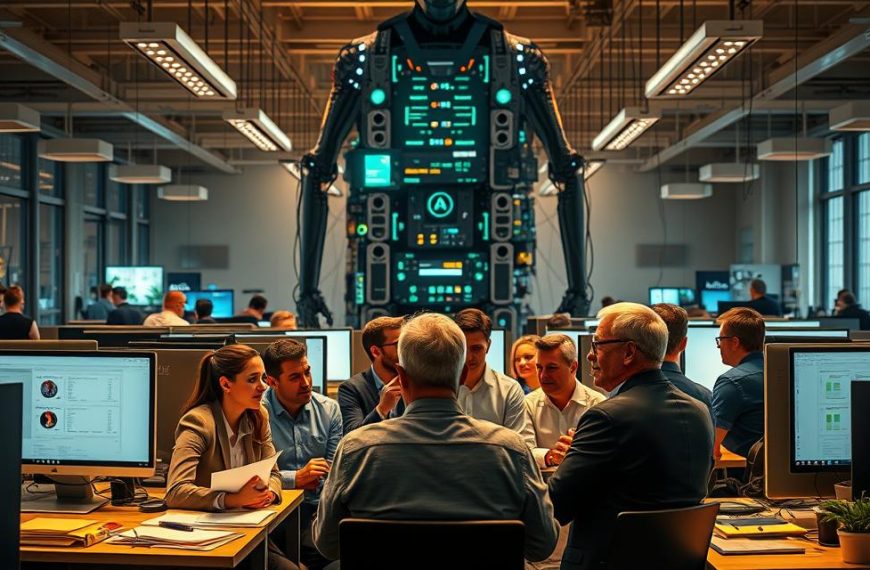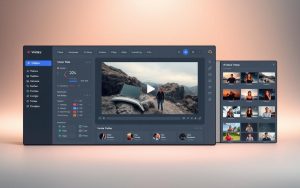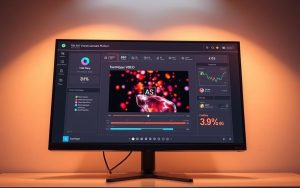The digital world is changing fast, thanks to artificial intelligence. It’s changing how we make and watch videos. Sites like TikTok, Instagram Reels, and YouTube Shorts are leading the way in content marketing. They need new ways to keep people interested.
Studies show that 85% of businesses now use short videos in their marketing. They’ve seen a 40% increase in conversion rates in just six months.
This big change has opened up new chances for creators and marketers. New platforms are popping up, with smart tools that make making videos easier and better.
Using smart tech is not just a trend anymore. It’s key to doing well online. This part looks at how these new tools are changing how we make content. And what it means for today’s marketers.
The Transformation of Digital Content Consumption
Digital media has changed a lot in recent years. Now, we see more short, engaging content that grabs our attention quickly. This big change affects how we interact with online content.
The Shift Towards Bite-Sized Media Formats
Today, the digital world loves short, impactful content more than long stories. Bite-sized media formats are now the top choice for online engagement. Platforms have changed their algorithms to show more short, exciting videos.
This change comes from how people use the internet now. Creators need to share value fast, not slow. They must work smarter to make content quickly.
Platform Evolution: TikTok, Instagram Reels and YouTube Shorts
Big social platforms have quickly adapted to this new trend. TikTok started with vertical short videos, and then Instagram Reels and YouTube Shorts followed. Each has special features for short videos.
These platforms have made special places for short videos to shine. Their algorithms focus on content under 60 seconds. This makes short videos key for getting noticed and keeping people engaged.
The competition among these platforms has led to new tools for automated content creation. These tools help creators make great short videos more easily.
Changing Audience Attention Spans and Preferences
Studies show our attention span online has dropped a lot. People now like quick, eye-catching content that gives value or fun right away.
This change brings both challenges and chances. Content must grab attention in the first three seconds and keep it for its short time.
Platforms use computer vision applications to understand what viewers like. This helps them suggest content that fits our shorter attention spans better.
| Platform | Average Video Length | Primary Audience | Key Features |
|---|---|---|---|
| TikTok | 15-60 seconds | Gen Z (16-24) | Duets, Green Screen, Effects Library |
| Instagram Reels | 15-90 seconds | Millennials (25-40) | Audio Sync, Templates, Remix |
| YouTube Shorts | 15-60 seconds | Multi-generational | Creation Tools, Music Library, Remix |
Core Technologies Powering Short AI Solutions
AI-driven short-form content works thanks to advanced tech. These systems look at huge amounts of data, spot patterns, and make content with little human help.
Three main technologies are key to short-form AI. Each one is important in making content that people enjoy and find relevant.

Natural Language Processing for Automated Content Creation
Natural Language Processing (NLP) lets machines understand and make human language. It’s used for writing scripts, captions, and structuring stories for short videos.
NLP looks at what’s popular and what people like to make content that fits. It can make different captions or scripts for different groups of viewers.
This use of NLP for content makes making content easier but keeps it good quality. It helps platforms make stories that grab people’s attention fast.
Computer Vision Applications in Video Analysis
Computer vision lets AI systems “see” and understand visual content. It’s key for breaking down short videos, spotting important parts, and improving quality.
Algorithms can find the best moments, suggest cuts, and even make videos look better. This means videos can look great without needing a lot of editing.
Computer vision also helps sort and check content. It tags videos based on what’s in them, making them easier to find and more relevant.
Machine Learning for Personalised Content Recommendations
Machine learning powers the smart recommendation systems on popular platforms. These systems look at what viewers like and watch to suggest videos that fit their tastes.
By looking at lots of data, machine learning guesses which videos viewers will like. This makes personalised recommendations that keep people watching and coming back.
The tech gets better over time by learning from how people interact with it. This means it keeps giving good suggestions as what people like changes.
Platforms like TikTok and YouTube Shorts use this tech to make feeds that are addictive and just for you. Their success shows how AI-driven personalised recommendations can keep people interested.
Practical Implementations of AI in Content Creation
Artificial intelligence has changed how we make short-form content. It brings us tools that make creating easier and faster. These tools help keep the quality high, making sure our content grabs the audience’s attention.
Automated Video Production and Enhancement
Today’s video production tools use AI to make editing easier. Descript’s Overdub lets you change voices and fix mistakes without starting over. It also finds the right spots to cut scenes, saving a lot of time.
Descript’s Overdub and Scene Detection Features
Descript changes how we edit audio. With Overdub, you can swap out voices using what you already have. Scene detection finds the best places to cut, making editing faster.
Runway ML’s Generative Video Capabilities
Runway ML brings new video tech to the table. You can change footage with just text, like removing objects or changing backgrounds. This helps small teams make professional-looking videos.
Intelligent Captioning and Transcription Services
Good transcription services are key for everyone to understand. AI now makes captions almost perfect, in real-time. It works in many languages and even special words.
YouTube’s Automatic Captioning Technology
YouTube’s captioning system uses AI to add subtitles automatically. It keeps getting better, handling different accents and jargon. This helps more people watch your videos.
Rev.ai’s Real-Time Transcription Solutions
Rev.ai offers fast and accurate transcription. It’s over 99% accurate, perfect for live events or quick content. It works well in noisy environments.
AI-Assisted Content Ideation and Scriptwriting
AI helps come up with ideas for content. It suggests viral concepts and scripts for short videos. It looks at what’s trending to find the best ideas.
Jasper.ai for Social Media Content Generation
Jasper.ai has templates for social media. It suggests catchy hooks and scene ideas based on trends. You can make ads ready for social media fast and keep your brand consistent.
Copy.ai’s Short-Form Content Templates
Copy.ai makes quick content with special templates. It creates many versions of captions and scripts fast. This lets you try out different ideas quickly.
AI makes creating content from start to finish easier. It lets creators make more content, fast and well, while keeping up with what platforms want.
Strategic Advantages and Operational Challenges
Artificial intelligence brings big chances for making short videos fast. But, it also brings big challenges that creators must think about carefully. Finding the right balance between saving time and dealing with problems is key.
Efficiency Gains in Content Production Workflows
AI tools change how we make videos by doing boring tasks for us. Creators say they save up to 10 hours a week. This means they can make a week’s worth of videos in just one day.
AI helps at every step of making videos:
- Automated video editing and making it better
- Quickly making transcripts and captions
- Easy scheduling and sharing videos
- Help with making videos better based on how they do
These tools let creators plan better instead of doing the work themselves. Saving time means they can make more videos and keep up with new trends.
Quality Consistency and Brand Voice Maintenance
Keeping videos consistent and true to a brand’s voice is hard with AI. AI can learn styles, but it might not get the brand’s message right.
To do well, brands need to teach AI and check its work often. They must set clear rules and check AI’s output to make sure it fits their brand. The content ideation AI tools can come up with ideas, but humans must check to keep the brand real.

Many companies use a mix of AI and human editors. AI makes the first draft, and then humans make it better. This way, AI’s speed helps, but the brand’s voice stays true.
Ethical Considerations in AI-Generated Media
AI content raises big ethical AI considerations that creators must think about. Being open about using AI is key for keeping trust and following the law.
Important ethical issues include:
- Rules for saying when content is made by AI
- Worries about fake news and deepfakes
- AI’s bias in suggesting content
- How AI affects jobs in creative fields
More and more, platforms want creators to be open about AI’s role. YouTube, for example, now requires creators to say when content is made by AI. This helps keep trust while letting new ideas grow.
Intellectual Property and Copyright Implications
AI content raises big questions about who owns what. Laws are changing as courts and lawmakers try to figure this out.
Current problems include:
- Who owns AI-made works?
- Copyright issues with data used to train AI
- Platform rules on AI content
- Rules for saying when AI helped make something
Big platforms are fighting against “AI slop” – low-quality content made mostly by AI. This shows growing worries about real content and who owns it.
Creators using AI must keep up with new laws and rules. It’s important to document how AI was used and what humans did. This helps protect rights to creative work.
The line between new ideas and rules is always moving as AI gets better. Keeping up with these changes is important for creators and companies.
Conclusion
AI is changing how we make and watch short videos. It uses natural language and computer vision to create videos and suggest content. This meets our need for fast, engaging media.
But, there are challenges. Copyright issues are becoming more complex with AI content. Brands must innovate ethically to keep our trust.
The future of AI content looks bright. New tools and data analysis will change how we make content. Brands need to keep up to stay ahead in digital marketing.
Short videos are key to AI marketing, fitting today’s viewing habits. They mark a shift, not just a trend. Brands that adopt AI wisely can stay true to themselves.
As tech advances, AI and short videos will work better together. Being up-to-date and flexible is vital for success in this fast-changing world.
FAQ
How is artificial intelligence revolutionising short-form content creation?
Artificial intelligence is changing how we make short videos. It helps with writing scripts, editing videos, and adding captions. This makes creating content faster and better, thanks to tech like Natural Language Processing and machine learning.
Platforms like TikTok, Instagram Reels, and YouTube Shorts are leading this change. They use AI to make content better, suggest videos, and keep users interested.
What are the key platforms driving the adoption of AI in short-form content?
TikTok, Instagram Reels, and YouTube Shorts are at the forefront. They use AI to help create content, suggest videos, and keep users engaged. This makes them key players in the AI-powered short-form media world.
How do AI tools help maintain quality and brand voice in content creation?
AI tools help keep content consistent by automating editing and captioning. But, creators need to adjust AI outputs to fit their brand’s tone. This ensures the content feels real and true to the brand.
What ethical considerations should creators keep in mind when using AI for content?
Creators should think about authenticity, transparency, and the risk of spreading false information. It’s important to be open about AI-generated content and respect others’ work. This builds trust with the audience.
Can AI-generated content achieve the same level of engagement as human-created content?
Yes, AI content can get people excited, thanks to personalisation and machine learning. But, the best content often mixes AI’s efficiency with human touch. This way, it connects emotionally with viewers.
What are the intellectual property implications of using AI in content creation?
Using AI raises questions about who owns the content and if it infringes on copyrights. Creators need to know the rules and policies of platforms and laws to avoid legal issues.
How do AI technologies like computer vision enhance video content?
Computer vision makes videos better by detecting scenes, recognising objects, and improving quality. It helps make short videos look great and professional.
What role does machine learning play in personalising content recommendations?
Machine learning looks at what viewers like and shows them videos that match their interests. This makes videos more engaging and keeps users watching longer.
Are there tools available for AI-assisted ideation and scriptwriting?
Yes, tools like Jasper.ai and Copy.ai help with coming up with ideas and writing scripts for short videos. They offer templates and ideas to make creating viral content easier.
How can marketers leverage AI in short-form content strategies?
Marketers can use AI to make content faster, target it better, and boost results. AI helps with editing, captions, and insights. This leads to more effective and engaging short-form campaigns.
